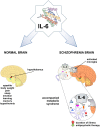Interleukin-6 in Schizophrenia-Is There a Therapeutic Relevance?
- PMID: 29163240
- PMCID: PMC5681495
- DOI: 10.3389/fpsyt.2017.00221
Interleukin-6 in Schizophrenia-Is There a Therapeutic Relevance?
Abstract
Renewing interest in immune aspects of schizophrenia and new findings about the brain-fat axis encourage us to discuss the possible role of interleukin-6 (IL-6) in schizophrenia. Previously, it was suggested that a primary alteration of the innate immune system may be relevant in schizophrenia. Functional dichotomy of IL-6 suggests that this chemical messenger may be responsible for regulating the balance between pro- and anti-inflammatory responses, with tissue-specific properties at the periphery and in the central nervous system. Specific phase of this chronic and deteriorating disorder must be considered, which can involve IL-6 in acute or possible chronic inflammation and/or autoimmunity. We give an overview of IL-6 role in the onset and progression of this disorder, also considering cognitive impairment and metabolic changes in patients with schizophrenia. Data suggest that decreased serum level of IL-6 following antipsychotic therapy could be predisposing factor for the development of obesity and obesity-related metabolic disorders in schizophrenia. As we reviewed, the IL-6 plays significant role in disease genesis and progression, so the use of specific inhibitors may not only be beneficial for exacerbation and alleviation of positive symptoms, but may attenuate cognitive impairment in patients with schizophrenia.
Keywords: immune response; inflammation; interleukin-6; metabolic syndrome; schizophrenia.
Figures

References
-
- Klimpel GR. Soluble factor(s) from LPS-activated macrophages induce cytotoxic T cell differentiation from alloantigen-primed spleen cells. J Immunol (1980) 125:1243–9. - PubMed
Publication types
LinkOut - more resources
Full Text Sources
Other Literature Sources
Research Materials

